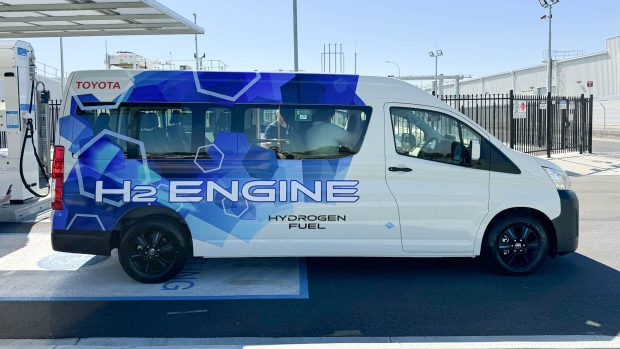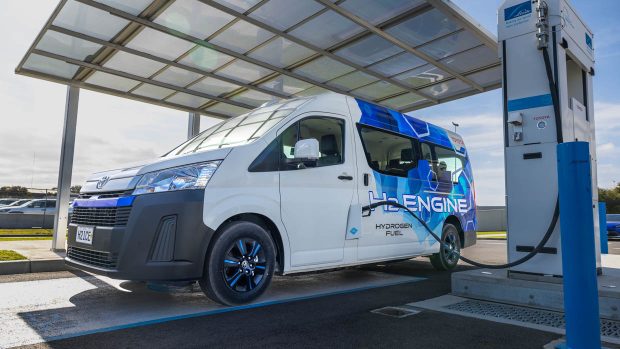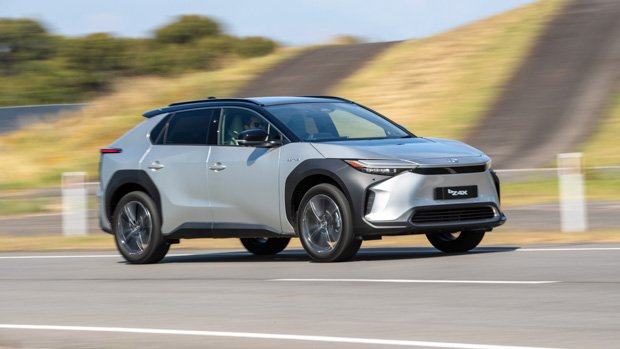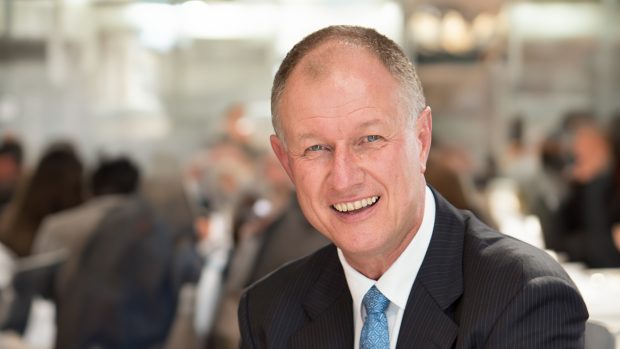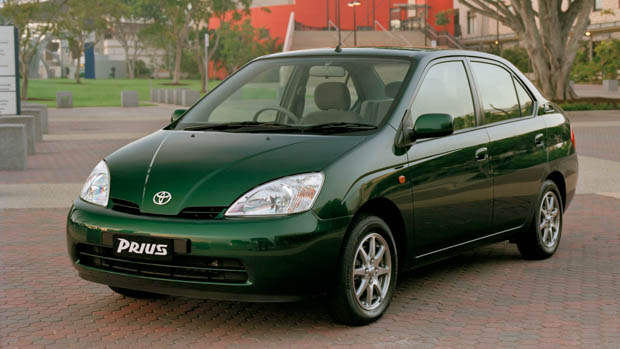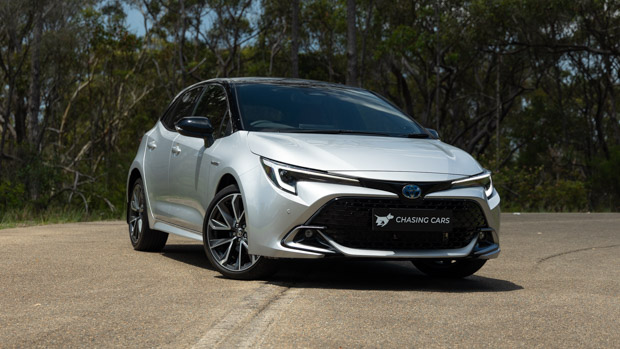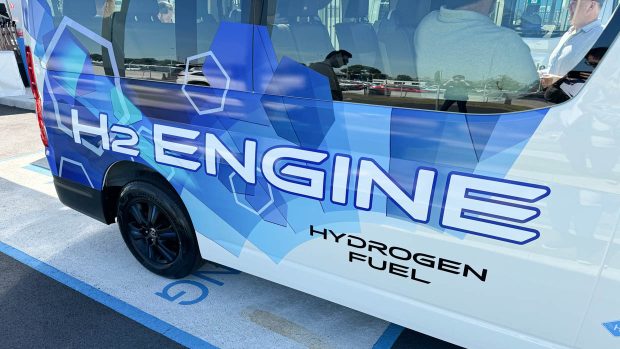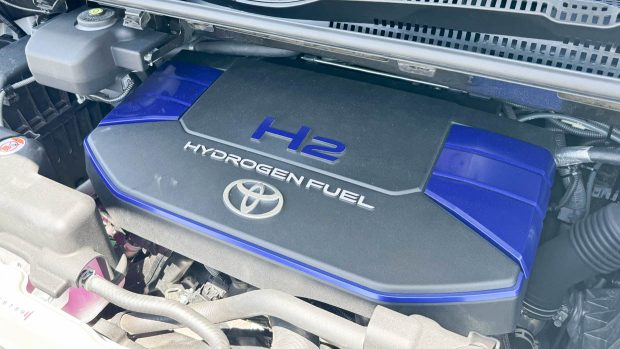-
Car Reviews
- All reviews
- Midsize SUVs
- Small cars
- Utes
- Small SUVs
- Large SUVs
- Large cars
- Sports SUVs
- Sports cars
- Vans
Latest reviews
- Car News
-
Car Comparisons
Latest comparisons
- Chasing Deals
When Toyota introduced hybrid cars in Australia two decades ago, it didn’t go smoothly. Hydrogen appears to be facing headwinds that are even stiffer
With the automotive world navigating a transition toward a lower-carbon future, Toyota continues to stick its neck out as a vocal champion of diverse powertrain solutions.
While Toyota will launch its first full EV in Australia next year – in the form of the BZ4X midsize SUV – this week, its attention was on a prototype Hiace van that retains an internal combustion engine but is fuelled with hydrogen instead of petrol or diesel.
Toyota suggests this is a cheap and easy conversion solution that reduces carbon emissions without the compromises of EVs for heavy duty segments. We’ve driven the hydrogen-ICE Hiace and the road test will appear on Chasing Cars soon.
The vehicle differs from Toyota’s other hydrogen-powered cars like the Mirai sedan – a fuel cell electric vehicle (FCEV) – which uses hydrogen to power an electric battery.
While an FCEV has zero tailpipe emissions, Toyota says a hydrogen-fuelled ICE vehicle like the Hiace prototype has “almost zero” CO2 emissions. Notably, small amounts of nitrogen oxide (NOx) are produced during the hydrogen ignition process, which Toyota says has been reduced to meet Euro VI standards.
While an exact emissions figure is not yet on hand, it is expected to be a significant improvement on the regular Hiace diesel engine which emits 197g/km of CO2 for the 2.8-litre four-cylinder turbo-diesel in long-wheel-base manual form.
Out of all regions the brand operates in, Toyota Australia has been particularly cautious about putting all of its eggs into the full-EV basket, and it stands apart from the likes of Tesla and BYD.
Toyota’s bet-hedging approach to EVs has earned it criticism from some quarters but the brand insists a multi-pathway approach will be proven right in time.
Toyota Australia’s especially cautious attitude on EVs has stood apart from Toyota’s global move to amp up electrification, with a new EV platform and sophisticated new EV batteries on the way, plus electric Land Cruiser and Hilux-esque EV concepts revealed in recent weeks.
The Australian arm of the brand continues to prosecute a case for hydrogen to join petrol, diesel, hybrid and fully-electric solutions on Australian roads – recently joining with other brands to champion hydrogen infrastructure development – and leading that case for the brand is its vice president of sales and marketing, Sean Hanley.
Hanley was outspoken even during Toyota’s electrification activities at last month’s Tokyo Motor Show in saying that EVs still can’t provide what he perceives as “the silent majority” require.
The Australian Toyota executive also spoke at length in Japan about the ongoing growth potential for hydrogen as an energy source on Australian roads – perhaps with a slight hint that it will be more suitable for commercial vehicles and heavy duty use cases, not private cars.
Speaking with Chasing Cars at a first drive in Melbourne of a prototype Toyota Hiace that retains its combustion engine but is fuelled with hydrogen, Hanley related that he’s seen powertrains be misunderstood before.
Hanley was closely involved with the launch of the Prius hybrid in Australia in 2001.
“They didn’t truly understand what the technology represented and the benefits, and despite our best intentions, everyone thought it was a BEV that you had to plug in”.
Hanley says that significant marketing investment had to go into “mythbusting” the Prius.
“We persisted because we believed in the technology and we believed that it would play a role in reducing our carbon footprint way back then, although we knew at that time, it was never going to be overnight”.
Today, Toyota hybrids make up a significant portion of the brand’s total sales.
“We learned that it takes time to gain the confidence of Australian consumers on new technology… and the only way you’ll ever gain the confidence of the market is to have them experience the product”.
To that point, Hanley maintains the view that hydrogen will be critical to fuelling some of Australia’s vehicle fleet in order to realise goals to reduce the nation’s carbon footprint.
“The reality of what [full EVs] can and can’t do is being understood,” says Hanley. “There are some countries in Europe where EVs are perfect, and they do exactly what they need to do…but in Australia, only [relying on] EVs may not be perfect.”
“We’re not opposed to them. They’ll play a role, but they’re not the only solution”.
Hanley insists that he is not looking to win or beat EVs with alternatives and rejects suggestions that Toyota’s multi-pathway approach ignores the trend towards electrification.
“It doesn’t matter who’s right and who’s wrong…there’s only one group that will determine who’s right or who’s wrong [on powertrain strategy], and that won’t be car companies, it won’t be governments. It’ll be consumers,” Hanley said.
Of the many powertrain options that Toyota is investing in, Hanley believes there are significant advantages to the hydrogen-fuelled internal combustion showcased as part of the hydrogen Hiace prototype reveal.
“Look at the cost amortisation – you’re using existing engine technology, an existing supplier base that have the know-how, existing labour and facilities that have the know-how, you’re using existing technology” Hanley said.
“The cost to convert or add that into a hydrogen conversion ICE engine is far less than starting from ground zero and having to invest in everything”.
Latest news
About Chasing cars
Chasing Cars reviews are 100% independent.
Because we are powered by Budget Direct Insurance, we don’t receive advertising or sales revenue from car manufacturers.
We’re truly independent – giving you Australia’s best car reviews.
